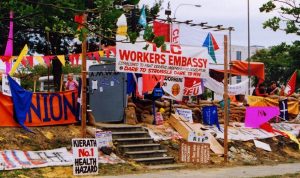I am told that “May you live in interesting times”, is often referred to as the Chinese curse. I don’t believe in curses in any providential sense, but it is true that, as professional historians, we are living in interesting times. There is much about our present context that makes it difficult for a historian as an independent and credible scholar. Digitalisation of historical resources has come at a price. Certainly it speeds up the research process and makes it even possible to access sources which were too distant to make it unfeasible to organise a research trip. It cannot be all put up online. The trip to the archives (hopefully not too far away) is still a necessity, and given the volume of archival material, it will still be a necessity for a long time to come. However, what the trained scholar has access to, so has the amateur historian. There is no problem in the fact that increasingly many folk now wish to take up the role of the amateur historian, nor is there a problem in the archivist making it easier for the disciplinary-untrained to do history work. Most archives have a public obligation to make material freely-available. The difficulty doesn’t lie here.
We live in interesting times because there is not just one factor at work. The technology presents a problem because it is part of a few other important socio-economic trends. The push for digital access has not come from professional historians, who certainly benefit from it, but from a strange fragmentation of history that has rapidly grown as a “bottom-up” historiographical approach. It started with oral history, and then came family history, and the recent trend now is property history. “Ordinary people” were given the tools to research, write and publish their own history. Twenty years ago academic historians thought this was all very wonderful. It was bringing the history discipline into the hands of the masses. The place of the scholarly historian would be secured in the fervour of populist celebrations of the historical moment; at least, that was what we thought. The problem was that the notion of the discipline didn’t carry with the exuberance for “history.” After the excitement of the Australian bicentenary and federation events, enrolments in history courses didn’t rise. They fell. Part of the problem was, weirdly, the reverse of fragmentation. It was the structural amalgamation of history into the other humanities. History in the schools was lost to Study of Society and the Environment (SOSE). As history courses failed to attract enrolments because kids hadn’t done scholarly history at school, the old Departments of History were amalgamated into super humanities schools. The impetus was economic policy but academic historians also eroded the health of the discipline with bloated arguments for multidisciplinary approaches.
The combination of these factors is where the difficulty lies. Employers and potential contractors now have an environment where it is hard to identify the role of disciplinary-trained (professional) historians. Many highly-talented independent scholars are caught by the fact that federal government funding policy prevents us proper and due employment in the universities, and by the fact that the market generally doesn’t comprehend our value. What we end up with is a niche market, but here also are interesting times. Professional historians are more often contracted as specialists in a field of history. One historian will get the contract or the employment because she or he has more expertise which matches the contractor/employer’s needs. That is fairly straight-forward. The difficulty is that, in the fragmentation mentioned, the amateur historians are now offering expertise against the professional. Amateur historians are being paid professional rates for oral, family, and property history projects.
The professional historian only has one difference over the amateur: the knowledge and skills in history as a discipline. As PHA (Qld) members, we are disciplinary-trained! To have a discipline is to share a scholarly outlook and agreed protocols. It is also to prove yourself to your peers by sharing the product of your work in a collegial context. We learn from each other and give precedence to those with more knowledge and experience in the discipline. The discipline of history is a communal activity and it is the one generalist skill-set that the amateur cannot deliver.
The astute reader will perceive that I have not mentioned local history as part of the populist fragmentation of history. There is a difference with the trend in local history. As good and proper as oral, family, and property history projects are for a professional historian to engage, local history seems to provide the best avenue for the professional historian to secure a place in the current environment. And interestingly it is a place where the professional and amateur historian can meet and work together. The difference is that, firstly, local history is more likely to be a wider group activity. Oral, family, and property history projects, unless they are linked into a larger history perspective, generally are oriented to the benefit of only a few individuals. I think it is also important that local history projects, in turn, are not parochial and take a wider view towards Queensland history.
Secondly, local history has a greater opportunity to utilise the generalist skill-set of the discipline. If I offer you the memory of a person, a family, or a property, there is much rich social history which can be ignored, and is often ignored by the amateur. However, if I offer a substantially-credible local history, as I would as a professional, I would have integrated all of the skills of the oral, family, and property specialists. And that mix would also be shaped by a historiography and historical narrative, which is not readily understood by the amateur.
Local history is not the only hope that we have to survive these interesting times. Primarily, there is the Association. It is not an industrial union. We just don’t have sort of combinational strength where anybody would pay any attention if we down-tooled. Unfortunately as scholars, combined or not, we are very expendable, like the Schott’s Almanac 2006 I bought for two dollars last week. Nevertheless, our association is our strength if each member looks to it as a means to cooperatively work together. The members of the Management Committee have been constructively looking out for opportunities to make it more than just interesting times for the members. It is up to each member to play their part in assisting our association of professional history through these difficult years.

